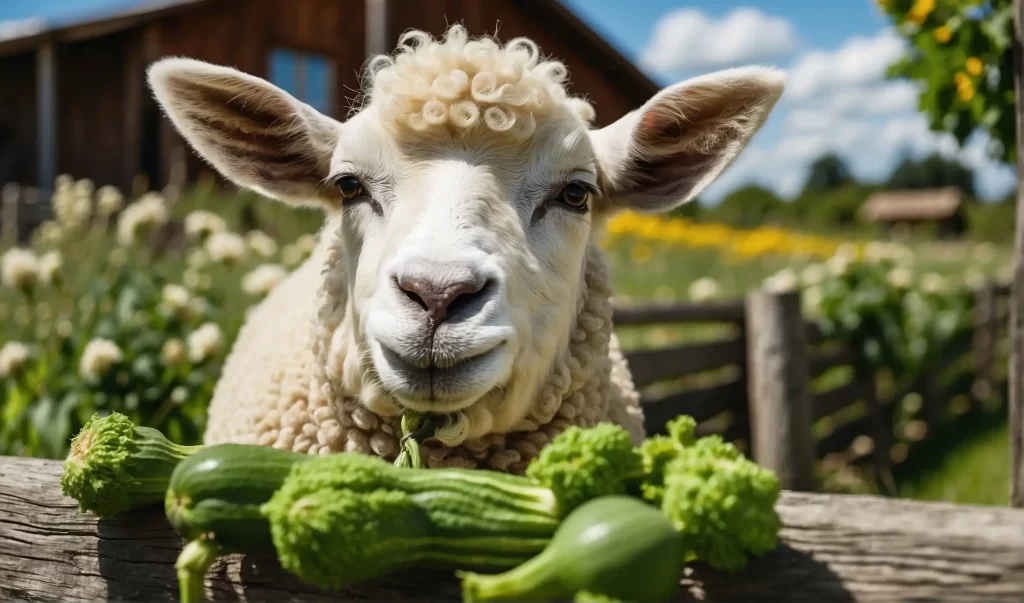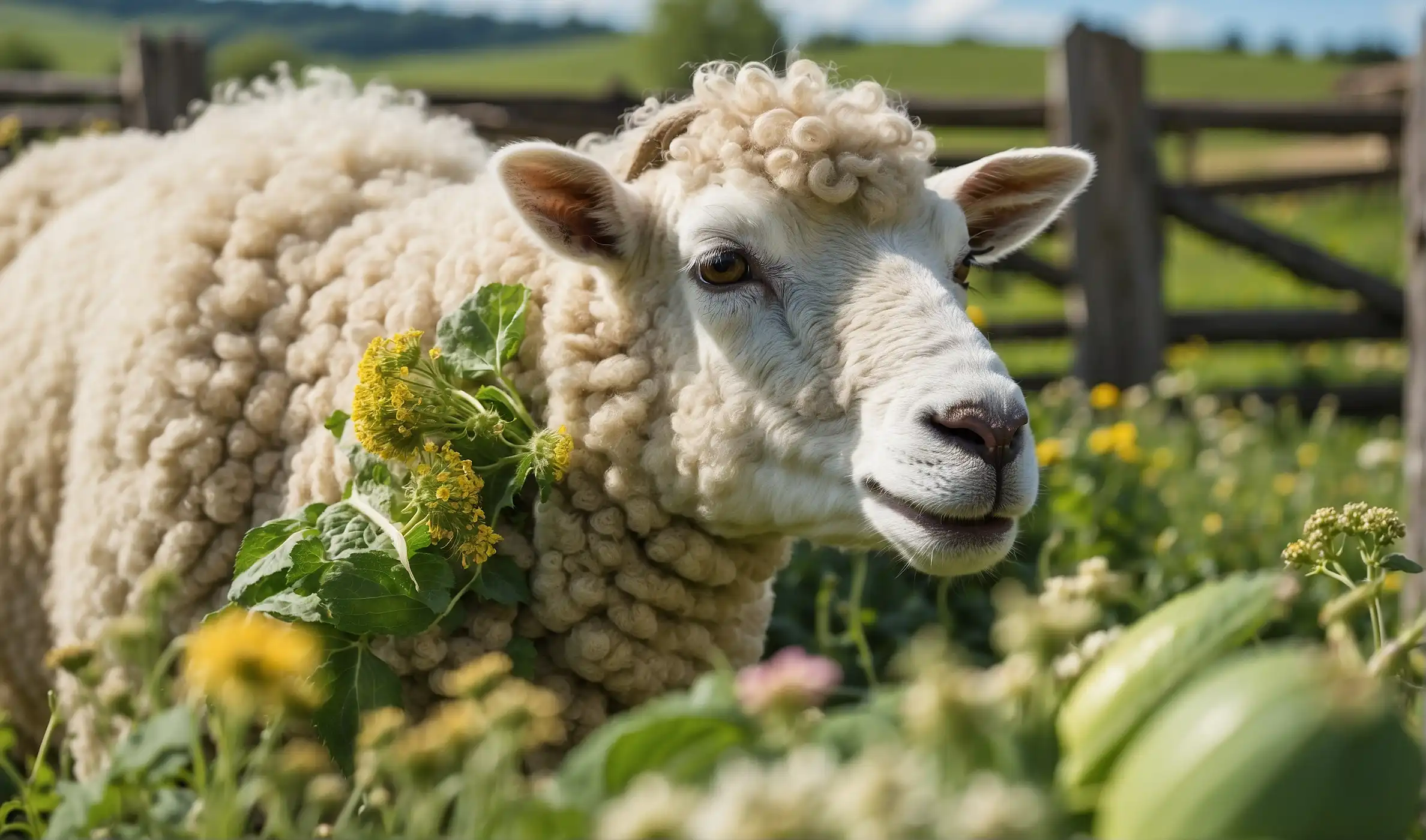Yes, sheep can safely eat zucchini. It’s a nutritious snack that provides hydration and vitamins.
Sheep are known to have diverse diets, often grazing on a variety of plants and vegetables, which makes zucchini a good fit for their consumption. Rich in water content and packed with essential nutrients, zucchini can be a healthful addition to a sheep’s diet.
Feeding sheep zucchini not only supports their need for fibrous vegetables but also introduces a good source of vitamins A and C, which are vital for their overall health. As owners look for ways to enrich the diets of their flock, zucchini emerges as an excellent choice due to its accessibility and the benefits it offers. Ensuring it is fed in moderation alongside their regular feed can help to maintain balanced nutrition for the animals. Care should always be taken to introduce any new food gradually to prevent digestive upset.
Dietary Habits and Sheep Nutrition
Sheep are herbivorous animals that thrive on a variety of plant-based foods, making zucchini a suitable addition to their diet. It’s essential for sheep to consume a diverse and nutritious diet to maintain overall health. Zucchini can be a good source of vitamins and minerals, and when fed in moderation, it complements their primary food source, which consists of hay, pasture, and specialized sheep feed.

The inclusion of zucchini should be carefully balanced with other dietary components to ensure sheep are not only getting all the necessary nutrients but also to prevent digestive issues. Overfeeding zucchini or any other treat can disrupt the delicate balance of their rumen, potentially causing health problems. Therefore, it is crucial for a sheep’s diet to be well-rounded and controlled. Providing sheep with a mix of forage, grains, and vegetables like zucchini can promote a healthy digestive system and optimal physical condition.
Incorporating Vegetables In Sheep Diets
Sheep can certainly benefit from the integration of vegetables in their diet, including a variety like zucchini. Vegetables are rich in nutrients such as vitamins, minerals, and antioxidants, which contribute to the overall health and wellbeing of sheep. These additional nutrients support immune function, aid in digestion, and can lead to the production of higher quality wool.
Feeding sheep a variety of safe vegetables ensures a more balanced diet. Among the common vegetables that sheep can consume without any adverse effects include carrots, beetroot, and pumpkin, alongside zucchini. These vegetables not only provide essential nutrients but also introduce variety into the sheep’s diet, which can improve feed intake and satiety. It’s important to monitor and control the portion sizes to prevent overfeeding, which can cause digestive problems.
Can Sheep Eat Zucchini Safely
Introducing zucchini into a sheep’s diet can add nutritional diversity, enriching it with essential vitamins and minerals. Zucchini is known to be rich in vitamin C, vitamin A, potassium, and antioxidants, all beneficial for the overall health of sheep. Its high water content can also help in keeping sheep hydrated, especially during hot weather.
Nevertheless, it is crucial to note that zucchini should be fed in moderation. Overfeeding may lead to digestive issues as sheep have sensitive gastrointestinal systems. To avoid any potential health risks, such as bloating or diarrhea, zucchini should be introduced into their diet slowly and remain a small portion of their overall intake. Ensuring that the zucchini is fresh and free from pesticides is equally important before offering it to sheep.
Zucchini’s Nutritional Profile
Zucchini is packed with an impressive nutritional profile that can offer significant benefits to sheep. This vegetable is rich in both essential vitamins like vitamin C, B6, and riboflavin, as well as various minerals including magnesium, potassium, and manganese. These nutrients contribute to a well-rounded diet, promoting optimal health and growth in sheep.
| Vitamin/Mineral | Benefits |
|---|---|
| Vitamin C | Boosts immune system, aids in healing. |
| Vitamin B6 | Important for protein metabolism, enhances brain health. |
| Riboflavin | Supports energy production, improves skin and eye health. |
| Magnesium | Crucial for bone health and enzyme function. |
| Potassium | Regulates fluid balance, maintains nerve function. |
| Manganese | Essential for growth, metabolism, and antioxidant system. |
Feeding zucchini to sheep can thus be an excellent way to enrich their diet, aiding in maintaining healthy bodily functions and potentially improving their overall well-being and productivity. As zucchini is a nutrient-dense food with high water content, it also helps in keeping sheep hydrated.
Also know: Can Budgies Eat Zucchini Raw
Feeding Zucchini to Sheep Properly
Sheep can safely enjoy zucchini as a part of their diet, but it’s essential to provide it in moderation. A recommended serving size is roughly half a cup of chopped zucchini per sheep once or twice a week. This ensures that the sheep receive a balanced diet without overindulging on this treat.
To prepare zucchini for sheep feeding, wash the vegetable thoroughly to remove any residues. Then, cut the zucchini into small, chewable pieces to prevent choking and facilitate easier digestion. There is no need to cook zucchini before offering it to sheep; they typically prefer their vegetables raw. Introduce zucchini into their diet gradually to assess each animal’s tolerance and avoid digestive upset.
Mixing Zucchini With Regular Feed
Introducing zucchini into a sheep’s diet can be a nutritious supplement when done correctly. It’s important to ensure that the zucchini is clean and free from pesticides, ideally coming from an organic source. Begin by offering small quantities of chopped zucchini to your sheep, mixing it in with their regular feed. This gradual introduction allows for the observation of any adverse reactions.
Zucchini should only make up a small portion of the overall diet, complementing the primary feed, not replacing it. Frequency should be limited to avoid digestive upset and to maintain a balanced intake of nutrients.
Before integrating new foods like zucchini, consulting a veterinarian or a livestock nutritionist can provide customized advice based on the specific needs of your flock. They can account for factors such as age, health status, and breed. Providing a variety of foods can encourage natural foraging behavior and promote overall health, but balance and moderation are key.
Potential Health Concerns
Sheep can experience digestive issues when consuming zucchini in large quantities or if they are not accustomed to this type of food in their diet. Symptoms to look out for include changes in appetite, signs of abdominal discomfort, and abnormalities in their feces, such as diarrhea or unusually loose stools.
Overfeeding sheep with zucchini might lead to excess nitrate intake, potentially causing toxicity. It is crucial to ensure that zucchini, along with any other supplemental feeds, is provided in moderation as part of a balanced diet. A sudden change in diet can also result in digestive upset, so any new foods should be introduced gradually. Monitoring sheep closely after introducing zucchini and consulting with a veterinarian if any health concerns arise is advised for maintaining optimal health.
Monitoring Sheep After Feeding Zucchini
Observing the behavior and health of sheep after they consume zucchini is crucial. Careful monitoring helps in identifying any adverse reactions or digestive issues that could potentially arise from their diet. Signs of discomfort, changes in appetite, or unusual fecal output are indicators to watch for. These symptoms may suggest that the zucchini is not agreeing with the sheep and adjustments to their diet may be necessary.
Farmers and shepherds should maintain a record of feeding times and amounts, as well as any notable changes in the sheep’s behavior post-consumption. Regular health check-ups are advisable to ensure the well-being of the flock. Consultation with a veterinarian is recommended if there are significant changes in behavior or health, as they can provide expert guidance on safe dietary practices for sheep.
FAQs Of Can Sheep Eat Zucchini
Is Zucchini Safe For Sheep To Eat?
Yes, zucchini is safe for sheep to eat. It is a nutritious vegetable that provides sheep with vitamins, minerals, and hydration. However, it should be given in moderation as part of a balanced diet.
Can Sheep Digest Zucchini Easily?
Sheep can easily digest zucchini since it’s a soft vegetable with high water content. It should be introduced gradually to avoid digestive upset and always be fresh and clean.
What Are The Benefits Of Feeding Zucchini To Sheep?
Feeding zucchini to sheep offers benefits like low-calorie hydration and essential nutrients like potassium and vitamin C. It can support their immune system and overall health when fed as a treat.
How Often Should Sheep Be Fed Zucchini?
Sheep should be fed zucchini in small, infrequent amounts. Treat it as an occasional supplement to their regular forage-based diet to ensure they get a variety of nutrients without digestive issues.
Conclusion
Feeding sheep zucchini can be a nutritious addition to their diet. As with any feed change, introduce it gradually and observe their health. Remember, moderation is key to avoid digestive issues. Zucchini provide variety and vital nutrients, highlighting the importance of a balanced diet for your flock.
Keep these tips in mind to ensure your sheep thrive on a diverse and healthy diet.
At Farm Pioneer, we emphasize the importance of organic fertilizers in zucchini cultivation, ensuring a healthier yield and sustainable farming practices.
